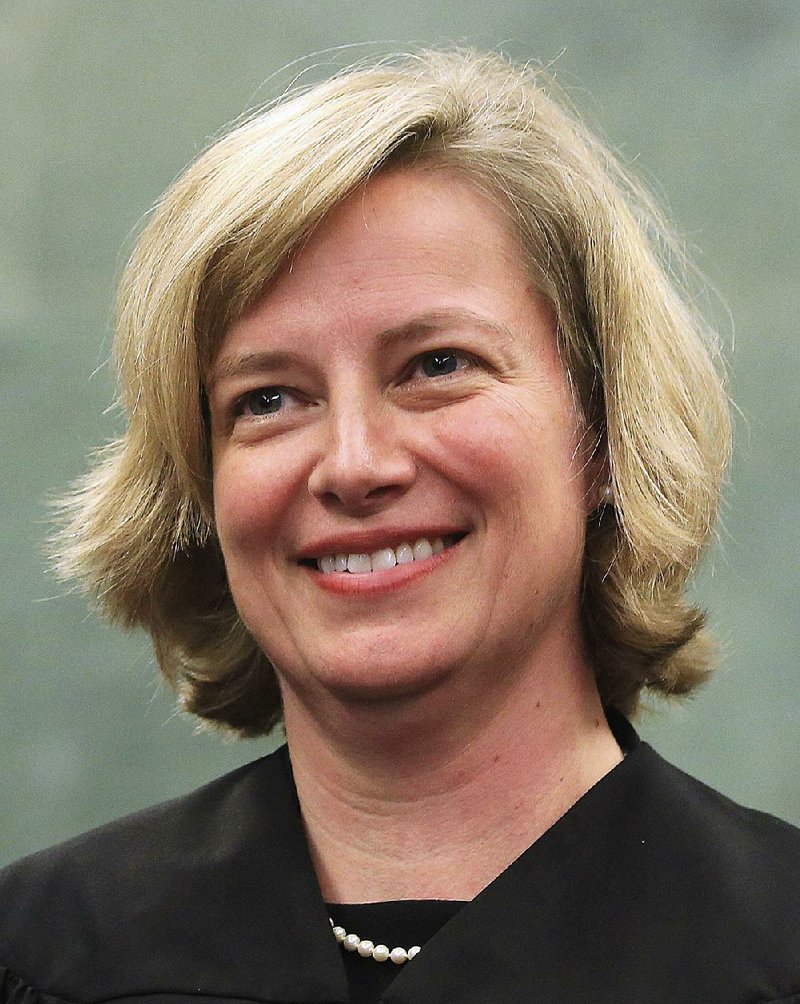A panel of federal appeals court judges ruled that Arkansas can implement a 2-year-old abortion law Friday, overturning the order of a U.S. district judge who later in the evening halted four newer abortion laws from taking effect.
First, a morning order from 8th U.S. Circuit Court of Appeals in St. Louis gave the preliminary go-ahead for the state to carry out new restrictions that Planned Parenthood says will reduce abortion access to a single clinic in the state.
However, in a separate ruling near midnight, U.S. District Judge Kristine Baker for the Eastern District of Arkansas sided with a doctor at a Little Rock abortion clinic who had challenged abortion restrictions enacted by the Legislature earlier this year.
It was Baker who issued the order blocking the Abortion Inducing Drugs Safety Act taking effect Jan. 1, 2016, the decision overturned earlier Friday by the three-judge panel on the 8th Circuit.
Her order Friday similarly halted Act 45 from taking effect Tuesday, as well as three other abortion laws.
Act 45 is a ban on the most commonly used procedure for abortions in the second trimester, which is a surgical procedure.
The Abortion Inducing Drugs Safety Act, or Act 577 of 2015, requires doctors who administer medical abortions through pills to contract with a physician with admitting privileges at a hospital.
Baker stopped that law over concerns of how many women it would cause to forgo abortions. However, the 8th Circuit judges said Friday she had to first make a more complete guess at the number of women burdened by the law before keeping it from taking effect.
Planned Parenthood's two clinics in the state offer only medication abortions. The group says that when the law takes effect, the clinics would have to stop performing the procedure.
The higher court vacated Baker's injunction of the law and sent the matter back to her court for more fact finding.
Within 14 to 21 days, the appeals court will issue a mandate allowing the law to take effect, said a spokesman for Attorney General Leslie Rutledge. Rutledge praised the decision.
Meanwhile, Planned Parenthood clinics in Little Rock and Fayetteville will continue to offer abortion services for now, according to a statement from the group.
A third clinic in Arkansas, Little Rock Family Planning Services, offers surgical abortions that are not affected by Act 577's requirements.
According to the Arkansas Department of Health, 556 pill-induced abortions were performed in Arkansas last year.
Together with Act 45, more than a third of the 3,207 abortions performed in the state last year were done with procedures that are set to be outlawed.
Abortion-rights advocates decried the 8th Circuit's ruling Friday, painting the law's requirements as "medically unnecessary." Planned Parenthood of the Great Plains, the plaintiff in the suit, said in a statement that it was evaluating its legal options.
Rutledge, the Republican attorney general, and anti-abortion groups including the Family Council expressed satisfaction with the decision, which they argued helps ensure abortions are safe for women.
The 8th Circuit's opinion, written by Appeals Court Judge Raymond Gruender, said Baker's ruling to halt the law "focused on amorphous groups of women" who would be forced to travel long distances to receive abortions in Little Rock.
While most abortion seekers in Arkansas already have to travel to Little Rock, Baker's ruling said that the law would require women in the "Fayetteville area" to travel 380 miles round trip for the procedure.
Because an earlier Arkansas law requires all abortion patients to consult with the doctor in person at least two days before the procedure, Baker said women would have to make two trips.
But Baker "failed to estimate the number of women who would forgo abortions," or delay the procedure, risking complications, the higher court said. It ordered her to do so.
According to court records, the Planned Parenthood clinic in Fayetteville performed 303 pill-induced abortions in 2014.
In her initial ruling, Baker said the state's argument that the law protected women from unsafe practices failed to outweigh the potential harm caused by reducing access to abortions. The 8th Circuit opinion did rule on the potential benefits of the law, but a footnote questioned the way Baker reached her decision.
Planned Parenthood argued in court records that it had tried, and failed, to find physicians who would contract with abortion clinics under the requirements of the law. The group says its doctors already consult with emergency rooms if there are complications, and can refer patients to other clinics or health centers.
"Let's be clear, laws like this one have no basis in quality patient care and are intended to end access to safe, legal abortion," said Planned Parenthood of the Great Plains President Laura McQuade in a statement. "Ideological extremists in the statehouse, not medical experts, design these policies that have no basis in medical science."
Rutledge, in a statement released through her spokesman, promised to continue to defend the "common sense law."
Baker has yet to actually rule on the merits of the case before her, in which Planned Parenthood argues Act 577 is an unconstitutional infringement on abortion rights.
The judge's injunction allowed her to prevent the law from going into effect while she considered the opposing arguments made in her court in March 2016. Baker has not said when she will issue a final ruling.
Originally, Planned Parenthood had additionally contested a section of Act 577 that required providers of the abortion pill to comply with U.S. Food and Drug Administration protocol, which Planned Parenthood argued was outdated.
In March 2016, the FDA updated its rules, and the issue became moot.
A Section on 07/29/2017

